#usa student income
Explore tagged Tumblr posts
Text

Part time Jobs in USA
JOBS LINK
#how much can you earn in usa as student#part time jobs in usa#how much can you earn by part time job in us#part time jobs in usa for indian students telugu#part time jobs in usa telugu#usa student income#international student salary in usa#usa part time salary telugu#usa part time telugu#part time jobs reality telugu#part time jobs for ms students in usa#ms students in usa#ms in us#ms in usa#usa telugu vlogs#telugu vlogs usa#usa#telugu vlogs#pat time
1 note
·
View note
Text

PART TIME JOB IN US
FOR INTERNATIONAL STUDENT
JOB LINK
#part time job#part time jobs#part time job at home#part time jobs for students#job#part time work#part time job for#online part time job#offline part time job#part time income jobs#10th pass part time job#part time job salary in usa#part time job opportunity#should i have a part time job#part time works#best part time job for student#part time job in usa for indian
2 notes
·
View notes
Text

Finding the correct part-time job
Job link
#part time job in usa#part time job in usa tamil#online part time job in usa#part time job in usa telugu#part time job income in usa#on campus part time jobs in usa#part time job in usa for indian#off campus part time jobs in usa#reality of part time jobs in usa#part time job in usa for students#part time jobs in usa for students#off campus part time jobs in usa telugu#part time job in usa for indian students#how to get part time job in usa in telugu#part time jobs for students in usa off campus#part time job in usa for international students#part time jobs in usa for indian students salary#part time jobs in usa for international students#part time jobs in usa for indian students malayalam#part time job in usa for international students tamil
1 note
·
View note
Text
Feminists will say stuff like "the government should not be involved in the decisions people make about their own body" and in most contexts I would agree.
But at the end of the day I am a federalist, and I think "staying out of it" isn't going far enough with reproductive rights. Not criminalizing the life-saving procedures we already have is a good start. But ideally a strong centralized government would be actively helping support the citizenry in their family planning.
Ever since the witch burnings and other missteps, the science of gynecology has lagged a century behind the rest of medicine. And as part of my hundred year reign of terror, I promise to reallocate all the funding we were wasting on our defense budget into the burgeoning field of uterine transplant research.
Because when every rich person in the world is trying to immigrate into your country for your healthcare, that's how you get back on top as a global superpower.
I'm just saying, unless you're an anarchist, we should be talking about how a hands-off approach really is the bare minimum. It's not a huge problem that the first-time-maternity age is rising, but the privatized IVF networks still take a very "robbing Peter to pay Paul" approach, and it would be nice if someone put forward an actual solution besides "let's just force women out of the workforce again". It would be nice if "Have your career and adventures first, then settle down" was celebrated as the foundation of a healthy and educated nuclear family, and empowered women were not treated as a boogeyman in Great Replacement talking points. It would be nice if we lived in an era of Science, where biology was forced to conform to human happiness, and we didn't have a bunch of religious nutjobs trying to argue that it should be the other way around.
#feminism#lgbt#federalism#strong central government#matriarchy now#usa#usa politics#pro choice#pro choice pro natalist#the sock puppet on my hand agrees: putting cryopreservation behind a paywall is softcore eugenics#people talk about abortion clinics in low-income neighborhoods being a “quiet genocide”#and as tonedeaf as this talking point is there is some truth to it but my guy treat the disease not the symptoms#if pcos effected men we would have a cure already#people have given kids up for adoption because of student debt this is NOT normal#liberals
1 note
·
View note
Text
I found an extremely dope disability survival guide for those who are homebound, bedbound, in need of disability accommodations, or would otherwise like resources for how to manage your life as a disabled person. (Link is safe)
It has some great articles and resources and while written by people with ME/CFS, it keeps all disabilities in mind. A lot of it is specific to the USA but even if you're from somewhere else, there are many guides that can still help you. Some really good ones are:
How to live a great disabled life- A guide full of resources to make your life easier and probably the best place to start (including links to some of the below resources). Everything from applying for good quality affordable housing to getting free transportation, affordable medication, how to get enough food stamps, how to get a free phone that doesn't suck, how to find housemates and caregivers, how to be homebound, support groups and Facebook pages (including for specific illnesses), how to help with social change from home, and so many more.
Turning a "no" into a "yes"- A guide on what to say when denied for disability aid/accommodations of many types, particularly over the phone. "Never take no for an answer over the phone. If you have not been turned down in writing, you have not been turned down. Period."
How to be poor in America- A very expansive and helpful guide including things from a directory to find your nearest food bank to resources for getting free home modifications, how to get cheap or free eye and dental care, extremely cheap internet, and financial assistance with vet bills
How to be homebound- This is pretty helpful even if you're not homebound. It includes guides on how to save spoons, getting free and low cost transportation, disability resources in your area, home meals, how to have fun/keep busy while in bed, and a severe bedbound activity master list which includes a link to an audio version of the list on Soundcloud
Master List of Disability Accommodation Letters For Housing- Guides on how to request accommodations and housing as well as your rights, laws, and prewritten sample letters to help you get whatever you need. Includes information on how to request additional bedrooms, stop evictions, request meetings via phone, mail, and email if you can't in person, what you can do if a request is denied, and many other helpful guides
Special Laws to Help Domestic Violence Survivors (Vouchers & Low Income Housing)- Protections, laws, and housing rights for survivors of DV (any gender), and how to get support and protection under the VAWA laws to help you and/or loved ones receive housing and assistance
Dealing With Debt & Disability- Information to assist with debt including student loans, medical debt, how to deal with debt collectors as well as an article with a step by step guide that helped the author cut her overwhelming medical bills by 80%!
There are so many more articles, guides, and tools here that have helped a lot of people. And there are a lot of rights, resources, and protections that people don't know they have and guides that can help you manage your life as a disabled person regardless of income, energy levels, and other factors.
Please boost!
#signal boost#please reblog#I'm so so glad this has gotten the traction that it has!#chronic pain#chronic illness#disability#fibromyalgia#cfs#chronic fаtiguе ѕуndrоmе#actually disabled#spoonie#me/cfs#cfs/me#long covid#important#invisible disability#ehlers danlos syndrome#lyme disease#chronically ill#cpunk#cripplepunk#it's a bummer that it's so US centric but if you're outside of the US you can look into similar programs#I hope that other countries have options like these#the US seems so behind when it comes to medical care and disability resources. and i mean it is#but it's good to know all of your rights as a disabled person or if you ever become disabled
22K notes
·
View notes
Note
how do we know in the books that john is indigenous? can you say more about how his indigeneity is important to his story?
hello! so there is a word of god post on race (doesn't mention John but mentions that Gideon is "mixed Maori"), BUT I frankly don't think word of god statements are worth any weight without actual in-text support (see: the "dumbledore is gay" situation). SO!
Specific evidence that John Gaius is Maori, as revealed in Nona the Ninth:
When he is listing his education, John mentions having gone to Dilworth School (John 20:8). Dilworth is an all boys boarding school in Auckland and accepts students based on financial need instead of academic or sporting achievements. Demographics appear to be about 70% low income Maori boys, indicating that it is highly likely that John is Maori
John reports that P- said he looked like a "Maori-TV pink panther" (John 15:23) when his eyes turned gold. Maori TV is a TV station that is focused primarily on Maori culture & language revitalization, with presumably all or mostly Maori hosts, and tbh I don't see why P- would say this unless John was himself Maori
John uses a te reo Māori phrase ("kia kaha, kia māia") (John 5:20) when he is saying goodbye to the corpses in the cryo lab before the power is shut off. Though it is possible he said this as a non-Maori kiwi, but in combination with the previous two points of evidence I think this all very strongly points to him being Maori
He also renames his daughter Kiriona Gaia, "Kiriona" being just literally the name "Gideon" in te reo Māori
TLT is not a series that hands you anything on a silver platter but to ME this is all pretty solid proof
Why is this relevant to The Locked Tomb?
In Nona the Ninth, we learn that before he completed apotheosis and ate the solar system, John was basically trying to save the earth from capitalism-caused climate change. Climate justice and the rights of indigenous people over their own land are deeply tied together, in the same way that climate catastrophe and capitalism/ imperialism/ colonialism are linked. disclaimer that this is NOT my area of study and others have definitely said it better; this is just the basic gist as I understand it, but on quick search I found some sources here and here if you want to do some reading.
TLT is not a series that hands you anything on a silver platter, but i don't think it is a stretch to see John as an indigenous man trying to save the earth and getting ignored and shut down at every turn by primarily western colonial powers (PanEuro, the USA) who declare him a terrorist and then as a reader thematically connecting that to the experience of indigenous climate activists IRL
there are absolutely TLT meta posts that have discussed this before me; tumblr search is nonfunctional and I have been looking for an hour and a half and cannot find anything specific even though i KNOW i reblogged multiple posts about this in the first few weeks following NTN's release. sad & I am sorry
I think that by the time the books take place, John is 10k years removed from the cultural context he grew up in, with the Nine Houses having become a genocidal colonial power in their own right (with more parallels to be made between John's forever war for the resources of literal life energy and like, oil wars), but I also think that John Gaius is a fictional character who can represent and symbolize multiple different things in service of telling a story. (not to mention the potential thematic parallels being made to how oppressed people sometimes are pressed into replicating the power dynamics of their oppressors and continuing the cycle--now that is a tumblr post i KNOW i read last year and definitely cannot find right now, once again sad & I am sorry)
How Radical Was John Gaius, Really is a forum thread that was locked by the moderators after 234534645674564 pages of heated debate
#john gaius#nona the ninth#the locked tomb#tlt meta#i need to fix my tagging system fr#john meta#tlt thoughts#trb.txt#if anyone wants to add anything or correct anything PLS do so!!! i did my best hope this helps anon. this took me 2 hours
862 notes
·
View notes
Text
All the books I reviewed in 2024

I reviewed 26 books this year: 15 novels, 5 nonfiction books, and 6 graphic novels. Even though I feel perennially behind on my reading (and objectively, I do have 10 linear feet of "to be read" books on the shelf), I think this is a pretty good haul.
Books are pretty much the ideal gift, if you ask me. Of course, I'm biased as a former bookseller and library worker, and as an author (of course) – I had three more books come out in 2024 (see the end of this post for details).
I started a lot more than 26 books this year. Long ago, I figured life was too short for books I wasn't enjoying, and I'm pretty ruthless about putting books down partway through if I think they're not going to reward finishing them. I probably start 10 books for every one I finish. However, I do review more than 90% of the books I get through. It's rare for me to keep reading a book all the way to the end if I'm not enjoying it enough to unconditionally recommend it. I rarely review books I don't like – there's not really any point in cataloging the list of books I think you won't enjoy reading, and most books I don't like very much are broken in ways that are too banal to comment upon.
The list below is pretty great, but if you're looking for more, here's the haul from 2023:
https://pluralistic.net/2023/12/01/bookmaker/#2023-in-review
NOVELS
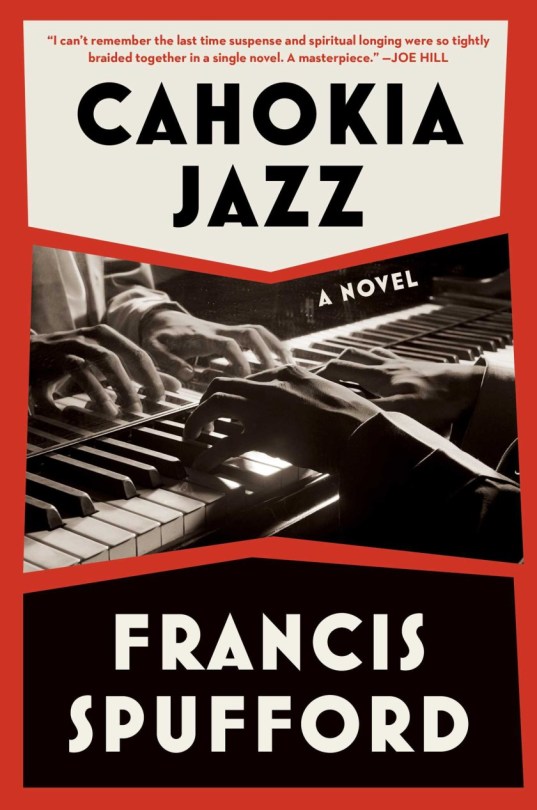
I. Cahokia Jazz by Francis Spufford
A fucking banger: it's a taut, unguessable whuddunit, painted in ultrablack noir, set in an alternate Jazz Age in a world where indigenous people never ceded most the west to the USA. It's got gorgeously described jazz music, a richly realized modern indigenous society, and a spectacular romance. It's amazing.
https://pluralistic.net/2023/12/04/cahokia/#the-sun-and-the-moon
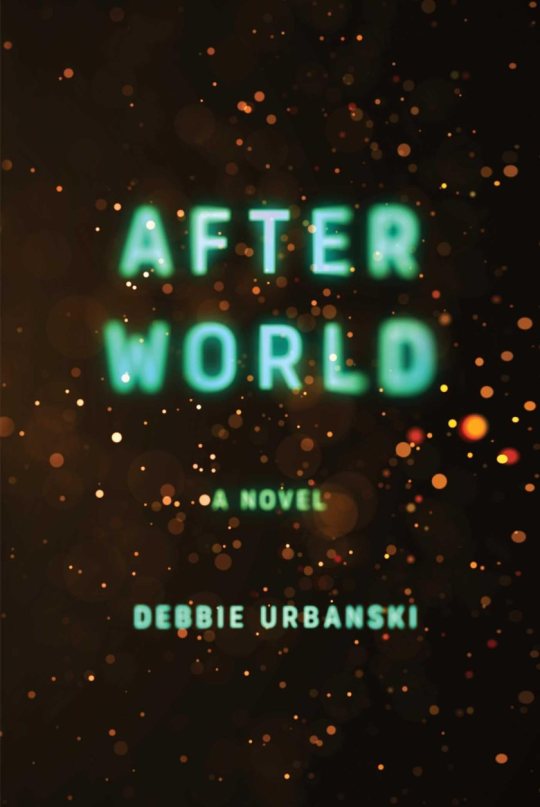
II. After World by Debbie Urbanski
An unflinching and relentlessly bleak tale of humanity's mass extinction, shot through with pathos and veined with seams of tragic tenderness and care. Sen Anon – the story's semi-protagonist – is 18 years old when the world learns that every person alive has been sterilized and so the human race is living out its last years.
The news triggers a manic insistence that this is a good thing – long overdue, in fact – and the perfect opportunity to scan every person alive for eventual reincarnation as virtual humans in an Edenic cloud metaverse called Gaia. That way, people can continue to live their lives without the haunting knowledge that everything they do makes the planet worse for every other living thing, and each other. Here, finally, is the resolution to the paradox of humanity: our desire to do good, and our inevitable failure on that score.
https://pluralistic.net/2023/12/18/storyworker-ad39-393a-7fbc/#digital-human-archive-project

III. Jonathan Abernathy You Are Kind by Molly McGhee
A dreamlike tale of a public-private partnership that hires the terminally endebted to invade the dreams of white-collar professionals and harvest the anxieties that prevent them from being fully productive members of the American corporate workforce.
We meet Jonathan as he is applying for a job that he was recruited for in a dream. As instructed in his dream, he presents himself at a shabby strip-mall office where an acerbic functionary behind scratched plexiglass takes his application and informs him that he is up for a gig run jointly by the US State Department and a consortium of large corporate employers. If he is accepted, all of his student debt repayments will be paused and he will no longer face wage garnishment. What's more, he'll be doing the job in his sleep, which means he'll be able to get a day job and pull a double income – what's not to like?
https://pluralistic.net/2024/01/08/capitalist-surrealism/#productivity-hacks
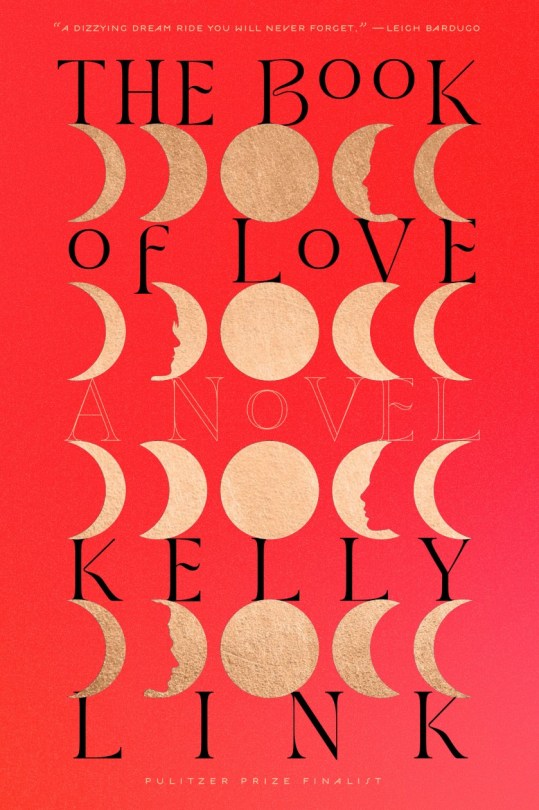
IV. The Book of Love by Kelly Link
If you've read Link's short stories (which honestly, you must read), you know her signature move: a bone-dry witty delivery, used to spin tales of deceptive whimsy and quirkiness, disarming you with daffiness while she sets the hook and yanks. That's the unmistakeable, inimitable texture of a Kelly Link story: deft literary brushstrokes, painting a picture so charming and silly that you don't even notice when she cuts you without mercy.
Turns out that she can quite handily do this for hundreds of pages, and the effect only gets better when it's given space to unfold.
It's a long and twisting mystery about friendship, love, queerness, rock-and-roll, stardom, parenthood, loyalty, lust and duty.
https://pluralistic.net/2024/02/13/the-kissing-song/#wrack-and-roll

V. Lyorn by Steven Brust
The seventeenth book in Steven Brust's long-running Vlad Taltos series. For complicated reasons, Vlad has to hide out in a theater. Why a theater? They are shielded from sorcery, as proof against magical spying by rival theater companies, and Vlad is on the run from the Left Hand of the Jhereg – the crime syndicate's all-woman sorceress squad – and so he has to hide in the theater.
The theater is mounting a production of a famous play that's about another famous play. The first famous play (the one the play is about – try and follow along, would you?) is about a famous massacre that took place thousands of years before. The play was mounted as a means of drumming up support for the whistleblower who reported on the massacre and was invited to a short-term berth in the Emperor's death row as a consequence.
The plot is a fantastic, fast-handed caper story that has a million moving parts, a beautiful prestige, and a coup de grace that'll have you cheering and punching the air.
https://pluralistic.net/2024/04/09/so-meta/#delightful-doggerel
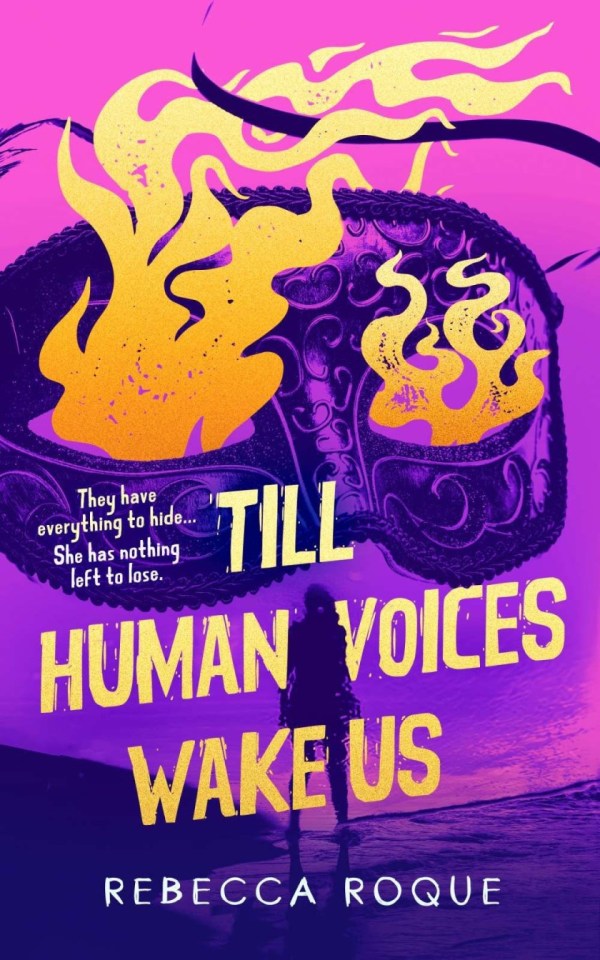
VI. Till Human Voices Wake Us by Rebecca Roque
A teen murder mystery told in the most technorealist way. Cia's best friend Alice has been trying to find her missing boyfriend for months, and in her investigation, she's discovered their small town's dark secret – a string of disappearances, deaths and fires that are the hidden backdrop to the town's out-of-control addiction problem.
Alice has something to tell Cia, something about the fire that orphaned her and cost her one leg when she was only five years old, but Cia refuses to hear it. Instead, they have a blazing fight, and part ways. It's the last time Cia and Alice ever see each other: that night, Alice kills herself.
Or does she? Cia is convinced that Alice has been murdered, and that her murder is connected to the drug- and death-epidemic that's ravaging their town. As Cia and her friends seek to discover the town's secret – and the identity of Alice's killer – we're dragged into an intense, gripping murder mystery/conspiracy story that is full of surprises and reversals, each more fiendishly clever than the last.
https://pluralistic.net/2024/04/16/dead-air/#technorealism
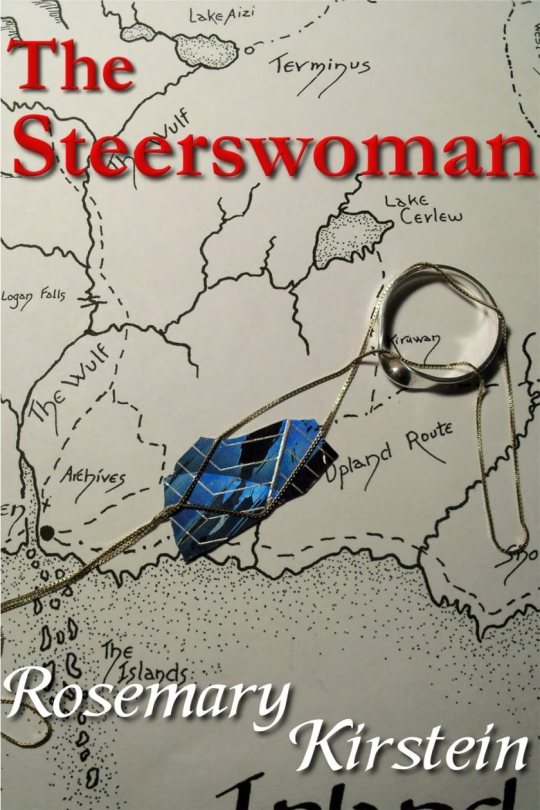
VII. The Steerswoman by Rosemary Kirstein
Randall "XKCD" Munroe pitched me on this over dinner: "All these different people kept recommending them to me, and they kept telling me that I would love them, but they wouldn't tell me what they were about because there's this huge riddle in them that's super fun to figure out for yourself. "The books were published in the eighties by Del Rey, and the cover of the first one had a huge spoiler on it. But the author got the rights back and she's self-published it."
How could I resist a pitch like that? So I ordered a copy. Holy moly is this a good novel! And yeah, there's a super interesting puzzle in it that I won't even hint at, except to say that even the book's genre is a riddle that you'll have enormous great fun solving.
https://pluralistic.net/2024/05/04/the-wulf/#underground-fave
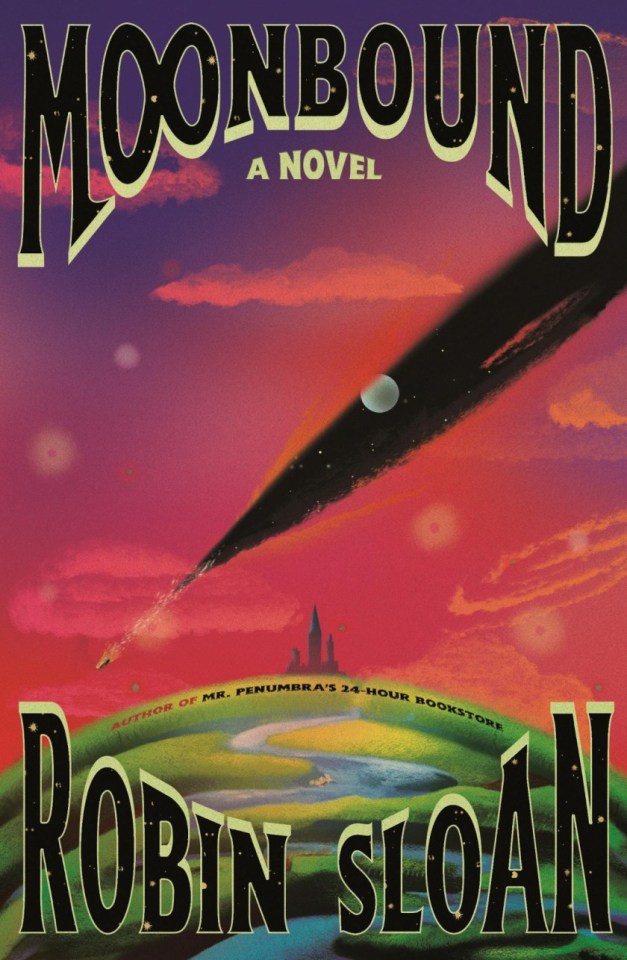
VIII. Moonbound by Robin Sloan
Moonbound's protagonist is a "chronicler," a symbiotic fungus engineered to nestle in a human's nervous system, where it serves as a kind of recording angel, storing up the memories, experiences and personalities of its host. When we meet the chronicler, it has just made a successful leap from its old host – a 10,000-years-dead warrior who had been preserved in an anaerobic crashpod ever since her ship was shot out of the sky – into the body of Ariel, a 12-year-old boy who had just invaded the long-lost tomb.
This is doing fiction in hard mode, and Sloan nails it. The unraveling strangeness of Ariel's world is counterpointed with the amazing tale of the world the chronicler hails from, even as the chonicler consults with the preserved personalities of the heroes and warriors it had previous resided in and recorded.
https://pluralistic.net/2024/06/11/penumbraverse/#middle-anth
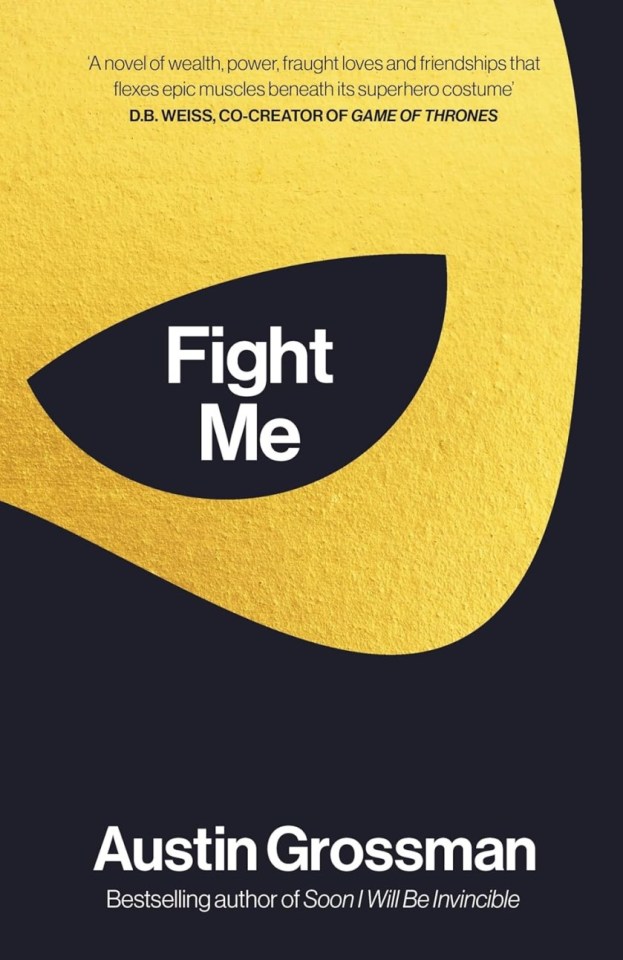
IX. Fight Me by Austin Grossman
Aging ex-teen superheroes weigh the legacy of Generation X, in a work that enrobes its savage critique with sweet melancholia, all under a coating of delicious snark. The Newcomers – an amped-up ninja warrior, a supergenius whose future self keeps sending him encouragement and technical schematics backwards through time, and an exiled magical princess turned preppie supermodel – have spent more than a decade scattered to the winds. While some have fared better than others, none of them have lived up to their potential or realized the dreams that seemed so inevitable when they were world famous supers with an entourage of fellow powered teens who worshipped them as the planet's greatest heroes.
As they set out to solve the mystery of the wizard who gave the protagonist his powers, they are reunited and must take stock of who they are and how they got there (cue Talking Heads' "Once In a Lifetime").
The publisher's strapline for this book is "The Avengers Meets the Breakfast Club," which is clever, but extremely wrong. The real comp for this book isn't "The Breakfast Club," it's "The Big Chill."
https://pluralistic.net/2024/07/01/the-big-genx-chill/#im-super-thanks-for-asking
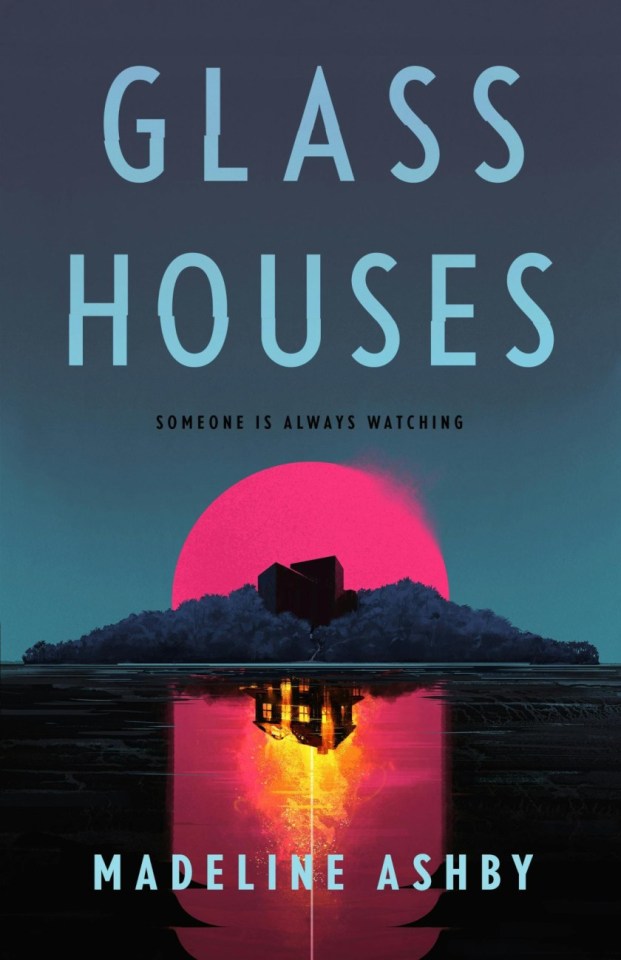
X. Glass Houses by Madeline Ashby
Kristen is the "Chief Emotional Manager" for Wuv, a hot startup that has defined the new field of "affective computing," which is when a computer tells you what everyone else around you is really feeling, based on the irrepressible tells emitted by their bodies, voices and gadgets.
Managing Sumter through Wuv's tumultuous launch is hard work for Kristen, but at last, it's paid off. The company has been acquired, making Kristen – and all her coworkers on the founding core team – into instant millionaires. They're flying to a lavish celebration in an autonomous plane that Sumter chartered when the action begins: the plane has a malfunction and crashes into a desert island, killing all but ten of the Wuvvies.
As the survivors explore the island, they discover only one sign of human habitation: a huge, brutalist, featureless black glass house, which initially rebuffs all their efforts to enter it. But once they gain entry, they discover that the house is even harder to leave.
https://pluralistic.net/2024/08/13/influencers/#affective-computing
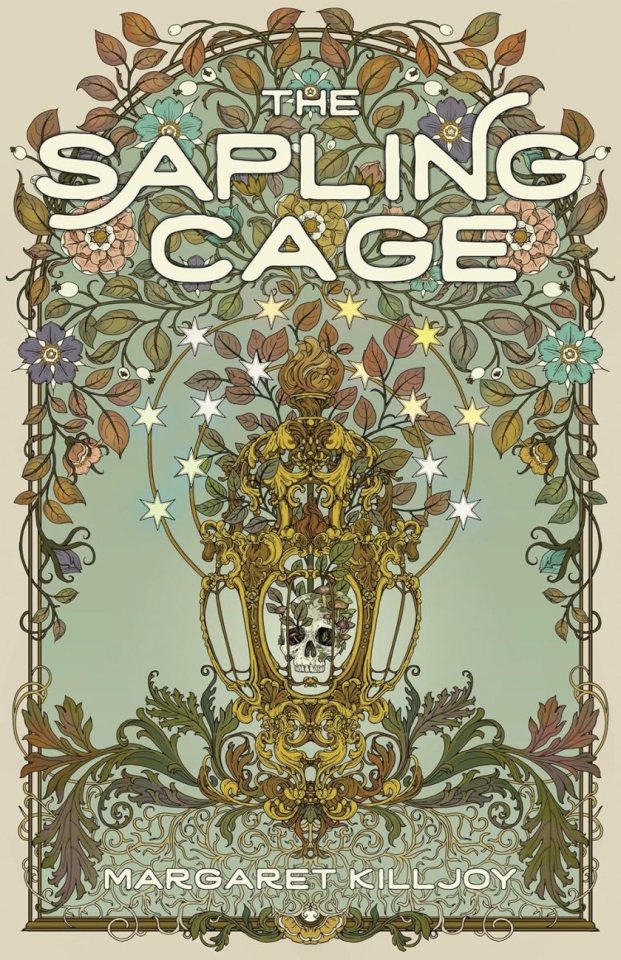
XI. The Sapling Cage by Margaret Killjoy
A queer coming-of-age tale in the mode of epic fantasy. Lorel wants to be a witch, but that's the very last of the adventurous trades to be strictly gender-segregated. Boys and girls alike run away to be knights, brigands and sailors, but only girls can become a witch. Indeed, Lorel's best friend, Lane, is promised to the witches, having been born to a witch herself.
Lorel has signed up for witching just as the land is turning against witches, thanks to a political plot by a scheming duchess who has scapegoated the witches as part of a plan to annex all the surrounding duchies, re-establishing the long-disintegrated kingdom with herself on the throne. To make things worse (for the witches, if not the duchess), there's a plague of monsters on the land, and the forests are blighted with a magical curse that turns trees to unmelting ice. This all softens up the peasantfolk for anti-witch pogroms.
So Lorel has to learn witching, even as her coven is fighting both monsters and the duchess's knights and the vigilante yokels who've been stirred up with anti-witch xenophobia.
https://pluralistic.net/2024/09/24/daughters-of-the-empty-throne/#witchy
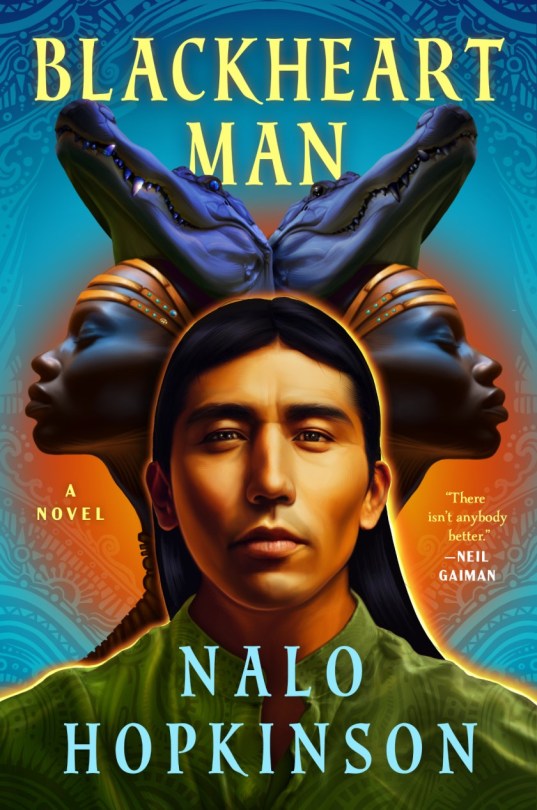
XII. Blackheart Man by Nalo Hopkinson
A story that will make you drunk on language, on worldbuilding, and on its roaring, relentless plot. The action is set on Chynchin, a fantastic Caribbean island (or maybe Caribbeanesque – it's never clear whether this is some magical, imaginary world, or some distant future of our own). Chynchin is a multiracial, creole land with a richly realized gift economy that Hopkinson deftly rounds out with a cuisine, languages, and familial arrangements.
Chynchin was founded through a slave rebellion, in which the press-ganged soldiers of the iron-fisted Ymisen empire were defeated by three witches who caused them to be engulfed in tar that they magicked into a liquid state just long enough to entomb them, then magicked back into solidity. For generations, the Ymisen have tolerated Chynchin's self-rule, but as the story opens, a Ymisen armada sails into Chynchin's port and a "trade envoy" announces that it's time for the Chynchin to "voluntarily" re-establish trade with the Ymisen.
The story that unfolds is a staple of sf and fantasy: the scrappy resistance mounted against the evil empire, and this familiar backdrop is a sturdy scaffold to support Hopkinson's dizzying, phantasmagoric tale of psychedelic magic, possessed children, military intrigue, musicianship and sexual entanglements.
https://pluralistic.net/2024/08/20/piche/#cynchin
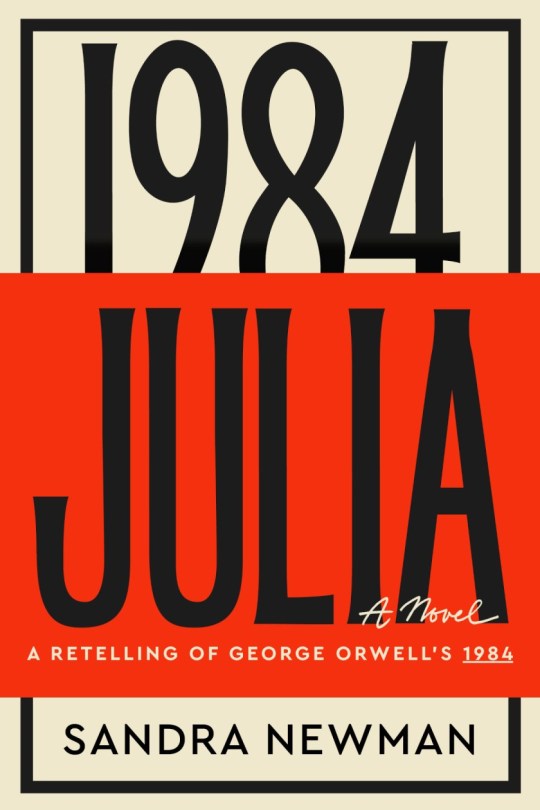
XIII. Julia by Sandra Newman
Julia is the kind of fanfic that I love, in the tradition of both The Wind Done Gone and Rosencrantz and Gildenstern Are Dead, in which a follow-on author takes on the original author's throwaway world-building with deadly seriousness, elucidating the weird implications and buried subtexts of all the stuff and people moving around in the wings and background of the original.
For Newman, the starting point here is Julia, an enigmatic lover who comes to Winston with all kinds of rebellious secrets – tradecraft for planning and executing dirty little assignations and acquiring black market goods. Julia embodies a common contradiction in the depiction of young women (she is some twenty years younger than Winston): on the one hand, she is a "native" of the world, while Winston is a late arrival, carrying around all his "oldthink" baggage that leaves him perennially baffled, terrified and angry; on the other hand, she's a naive "girl," who "doesn't much care for reading," and lacks the intellectual curiosity that propels Winston through the text.
This contradiction is the cleavage line that Newman drives her chisel into, fracturing Orwell's world in useful, fascinating, engrossing ways. Through Julia's eyes, we experience Oceania as a paranoid autocracy, corrupt and twitchy. We witness the obvious corollary of a culture of denunciation and arrest: the ruling Party of such an institution must be riddled with internecine struggle and backstabbing, to the point of paralyzed dysfunction. The Orwellian trick of switching from being at war with Eastasia to Eurasia and back again is actually driven by real military setbacks – not just faked battles designed to stir up patriotic fervor. The Party doesn't merely claim to be under assault from internal and external enemies – it actually is.
https://pluralistic.net/2024/09/28/novel-writing-machines/#fanfic

XIV. The Wilding by Ian McDonald
McDonald's first horror novel, and it's fucking terrifying. It's set in a rural Irish peat bog that has been acquired by a conservation authority that is rewilding it after a century of industrial peat mining that stripped it back nearly to the bedrock. This rewilding process has been greatly accelerated by the covid lockdowns, which reduced the human footprint in the conservation area to nearly zero.
Lisa's last duty before she leaves the bog and goes home to Dublin is leading a school group on a wild campout in one of the bog's deep clearings. It's a routine assignment, and while it's not her favorite duty, it's also not a serious hardship.
But as the group hikes out to the campsite, one of her fellow guides is killed, without warning, by a mysterious beast that moves so quickly they can barely make out its monstrous form. Thus begins a tense, mysterious, spooky as hell story of survival in a haunted woods, written in the kind of poesy that has defined McDonald's career, and which – when deployed in service of terror – has the power to raise literal goosebumps.
https://pluralistic.net/2024/10/25/bogman/#erin-go-aaaaaaargh

XV. Polostan by Neal Stephenson
Not a spy novel, but a science fiction novel about spies in an historical setting. This isn't to say that Stephenson tramples on, or ignores spy tropes: this is absolutely a first-rate spy novel. Nor does Stephenson skimp on the lush, gorgeously realized and painstakingly researched detail you'd want from an historical novel.
Polostan raises the curtain on the story of Dawn Rae Bjornberg, AKA Aurora Maximovna Artemyeva, whose upbringing is split between the American West in the early 20th century and the Leningrad of revolutionary Russia (her parents are an American anarchist and a Ukrainian Communist who meet when her father travels to America as a Communist agitator). Aurora's parents' marriage does not survive their sojourn to the USSR, and eventually Aurora and her father end up back in the States, after her father is tasked with radicalizing the veterans of the Bonus Army that occupied DC, demanding the military benefits they'd been promised.
All of this culminates in her return sojourn to the Soviet Union, where she first falls under suspicion of being an American spy, and then her recruitment as a Soviet spy.
Also: she plays a lot of polo. Like, on a horse.
https://pluralistic.net/2024/11/04/bomb-light/#nukular
NONFICTION
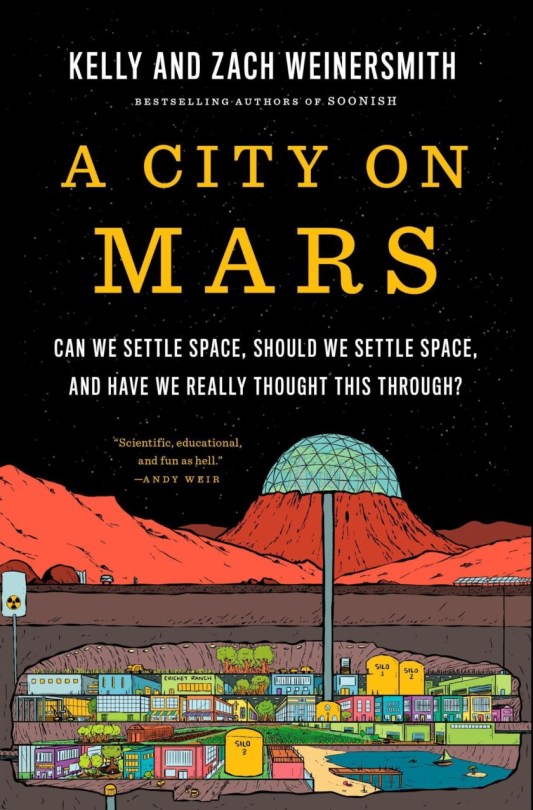
I. A City on Mars by Kelly and Zach Weinersmith
Biologist Kelly Weinersmith and cartoonist Zach Weinersmith set out to investigate the governance challenges of the impending space settlements they were told were just over the horizon. Instead, they discovered that humans aren't going to be settling space for a very long time, and so they wrote a book about that instead.
The Weinersmiths make the (convincing) case that every aspect of space settlement is vastly beyond our current or reasonably foreseeable technical capability. What's more, every argument in favor of pursuing space settlement is errant nonsense. And finally: all the energy we are putting into space settlement actually holds back real space science, which offers numerous benefits to our species and planet (and is just darned cool).
https://pluralistic.net/2024/01/09/astrobezzle/#send-robots-instead
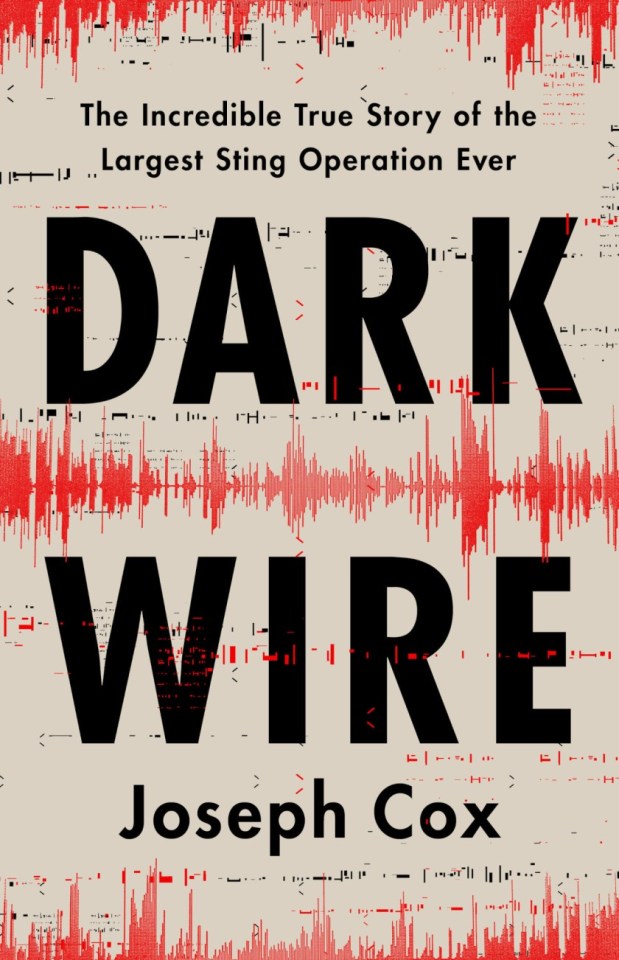
II. Dark Wire by Joseph Cox
Cox spent years on the crimephone beat, tracking vendors who sold modded phones (first Blackberries, then Android phones) to criminal syndicates with the promise that they couldn't be wiretapped by law-enforcement.
He tells the story of the FBI's plan to build an incredibly secure, best-of-breed crimephone, one with every feature that a criminal would want to truly insulate themselves from law enforcement while still offering everything a criminal could need to plan and execute crimes.
This is really two incredible tales. The first is the story of the FBI and its partners as they scaled up Anom, their best-of-breed crimephone business. This is a (nearly) classic startup tale, full of all-nighters, heroic battles against the odds, and the terror and exhilaration of "hockey-stick" growth.
The other one is the crime startup, the one that the hapless criminal syndicates that sign up to distribute Anom devices find themselves in the middle of. They, too, are experiencing hockey-stick growth. They, too, have a fantastically lucrative tiger by the tail. And they, too, have a unique set of challenges that make this startup different from any other.
Cox has been on this story for a decade, and it shows. He has impeccable sourcing and encyclopedic access to the court records and other public details that allow him to reproduce many of the most dramatic scenes in the Anom caper verbatim.
https://pluralistic.net/2024/06/04/anom-nom-nom/#the-call-is-coming-from-inside-the-ndrangheta
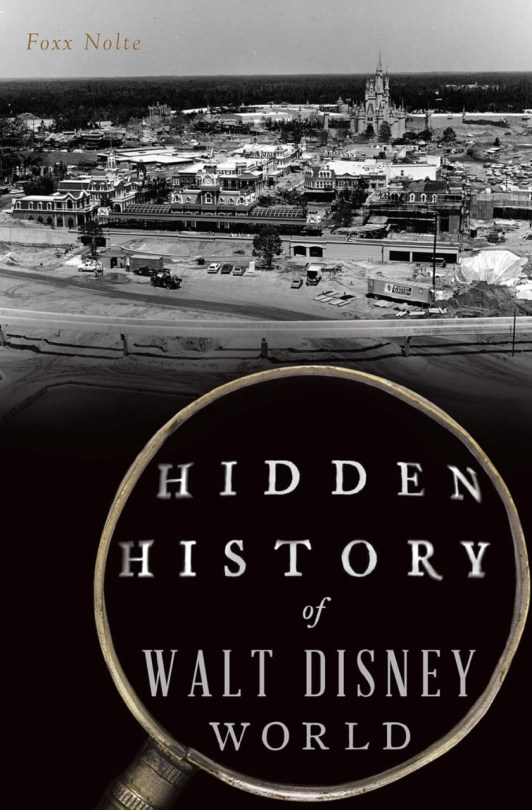
III. The Hidden History of Walt Disney World by Foxx Nolte
No one writes about Disney theme parks like Foxx Nolte; no one rises above the trivia and goes beyond the mere sleuthing of historical facts, no one nails the essence of what makes these parks work – and fail.
The history of Walt Disney World is also a history of the American narrative from the 1960s to the turn of the millennium, especially once Epcot enters the picture and Disney sets out to market itself as a futuristic mirror to America and the world. There's a doomed plan to lead the nation in the provision of an airport for the largely hypothetical short runway aircraft that never materialized, the Disney company's love-hate affair with Florida's orange growers, and the geopolitics of installing a permanent World's Fair, just as World's Fairs were disappearing from the world stage.
In focusing on the conflicts between different corporate managers, outside suppliers, and the gloriously flamboyant weirdos of Florida, Nolte's history of Disney World transcends amusing anaecdotes and tittle-tattle – rather, it illustrates how the creative sparks thrown off by people smashing into each other sometimes created towering blazes of glory that burn to this day.
https://pluralistic.net/2024/07/15/disnefried/#dialectics
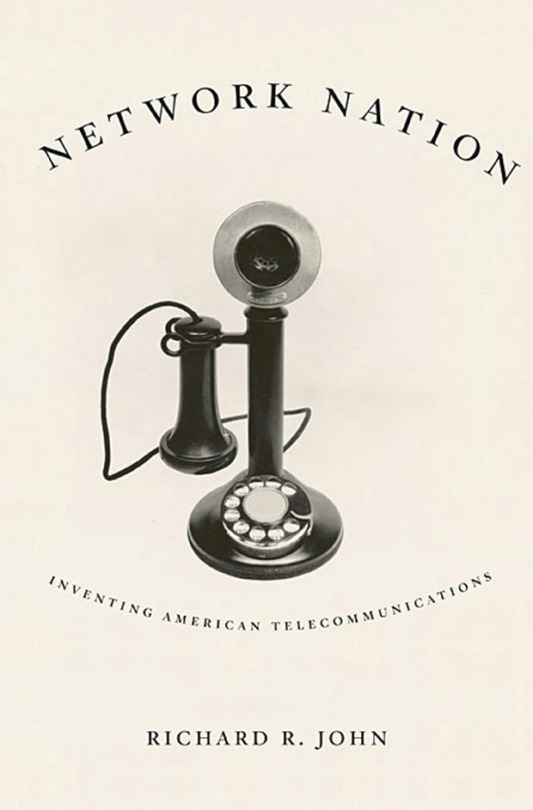
IV. Network Nation by Richard R John
An extremely important, brilliantly researched, deep history of America's love/hate affair with not just the telephone, but also the telegraph. It is unmistakably as history book, one that aims at a definitive takedown of various neat stories about the history of American telecommunications.
The monopolies that emerged in the telegraph and then the telephone weren't down to grand forces that made them inevitable, but rather, to the errors made by regulators and the successful gambits of the telecoms barons. At many junctures, things could have gone another way.
Most striking about this book were the parallels to contemporary fights over Big Tech trustbusting, in our new Gilded Age. Many of the apologies offered for Western Union or AT&T's monopoly could have been uttered by the Renfields who carry water for Facebook, Apple and Google. John's book is a powerful and engrossing reminder that variations on these fights have occurred in the not-so-distant past, and that there's much we can learn from them.
https://pluralistic.net/2024/07/18/the-bell-system/#were-the-phone-company-we-dont-have-to-care
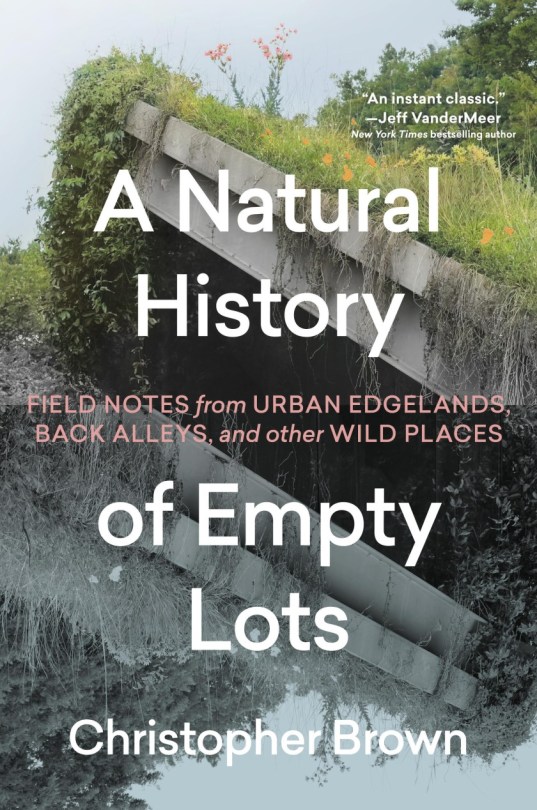
V. A Natural History of Empty Lots by Christopher Brown
A frustratingly hard to summarize book, because it requires a lot of backstory and explanation, and one of the things that makes this book so! fucking! great! is how skillfully Brown weaves disparate elements – the unique house he built in Austin, the wildlife he encounters in the city's sacrifice zones, the politics that created them – into his telling.
This series of loosely connected essays that explains how everything fits together: colonial conquest, Brown's failed marriage, his experience as a lawyer learning property law, what he learned by mobilizing that learning to help his neighbors defend the pockets of wildness that refuse to budge.
It's filled with pastoral writing that summons Kim Stanley Robinson by way of Thoreau, and it sometimes frames its philosophical points the way a cyberpunk writer would.
The kind of book that challenges how you feel about the crossroads we're at, the place you live, and the place you want to be.
https://pluralistic.net/2024/09/17/cyberpunk-pastoralism/#time-to-mow-the-roof
GRAPHIC NOVELS
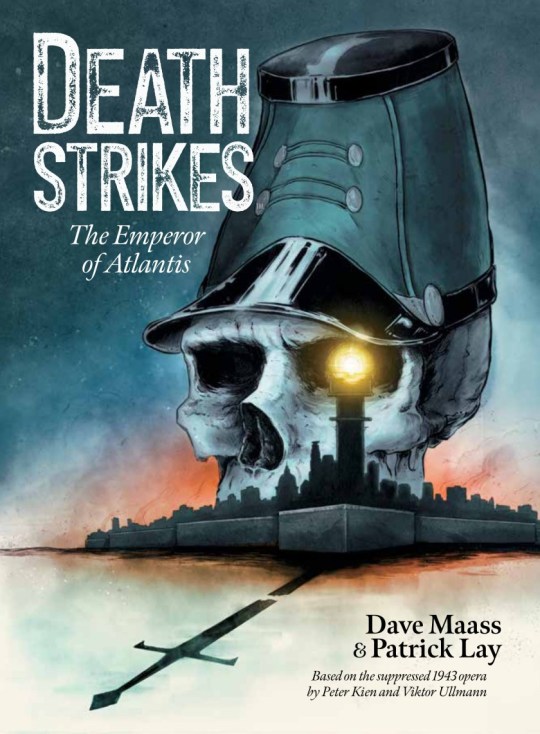
I. Death Strikes by David Maass and Patrick Lay
"The Emperor of Atlantis," is an opera written by two Nazi concentration camp inmates, the librettist Peter Kien and the composer Viktor Ullmann, while they were interned in Terezin, a show-camp in Czechoslovakia that housed numerous Jewish artists, who were encouraged to make and display their work as a sham to prove to the rest of the world that Nazi camps were humane places.
Death Strikes was adapted by my EFF colleague Dave Maass, an investigator and muckraker and brilliant writer, who teamed up with illustrator Patrick Lay and character designer Ezra Rose (who worked from Kien and Ullmann's original designs, which survived along with the score and libretto).
The Emperor's endless wars have already tried Death's patience. Death brings mercy, not vengeance, and the endless killing has dismayed him. The Emperor's co-option drives him past the brink, and Death declares a strike, breaking his sword and announcing that henceforth, no one will die.
Needless to say, this puts a crimp in the Emperor's all-out war plan. People get shot and stabbed and drowned and poisoned, but they don't die. They just hang around, embarrassingly alive (there's a great comic subplot of the inability of the Emperor's executioners to kill a captured assassin).
While this is clearly an adaptation, Kien and Ullmann's spirit of creativity, courage, and bittersweet creative ferment shines through. It's a beautiful book, snatched from death itself.
https://pluralistic.net/2024/01/23/peter-kien-viktor-ullmann/#terez

II. My Favorite Things Is Monsters Book Two by Emil Ferris
The long, long delayed sequel to the tale of Karen Reyes, a 10 year old, monster-obsessed queer girl in 1968 Chicago who lives with her working-class single mother and her older brother, Deeze, in an apartment house full of mysterious, haunted adults. There's the landlord – a gangster and his girlfriend – the one-eyed ventriloquist, and the beautiful Holocaust survivor and her jazz-drummer husband.
Ferris's storytelling style is dazzling, and it's matched and exceeded by her illustration style, which is grounded in the classic horror comics of the 1950s and 1960s. Characters in Karen's life – including Karen herself – are sometimes depicted in the EC horror style, and that same sinister darkness crowds around the edges of her depictions of real-world Chicago.
Book Two picks up from Book One's cliffhanger and then rockets forward. Everything brilliant about One is even better in Two – the illustrations more lush, the fine art analysis more pointed and brilliant, the storytelling more assured and propulsive, the shocks and violence more outrageous, the characters more lovable, complex and grotesque.
Everything about Two is more. The background radiation of the Vietnam War in One takes center stage with Deeze's machinations to beat the draft, and Deeze and Karen being ensnared in the Chicago Police Riots of '68. The allegories, analysis and reproductions of classical art get more pointed, grotesque and lavish. Annika's Nazi concentration camp horrors are more explicit and more explicitly connected to Karen's life. The queerness of the story takes center stage, both through Karen's first love and the introduction of a queer nightclub. The characters are more vivid, as is the racial injustice and the corruption of the adult world.
https://pluralistic.net/2024/06/01/the-druid/#
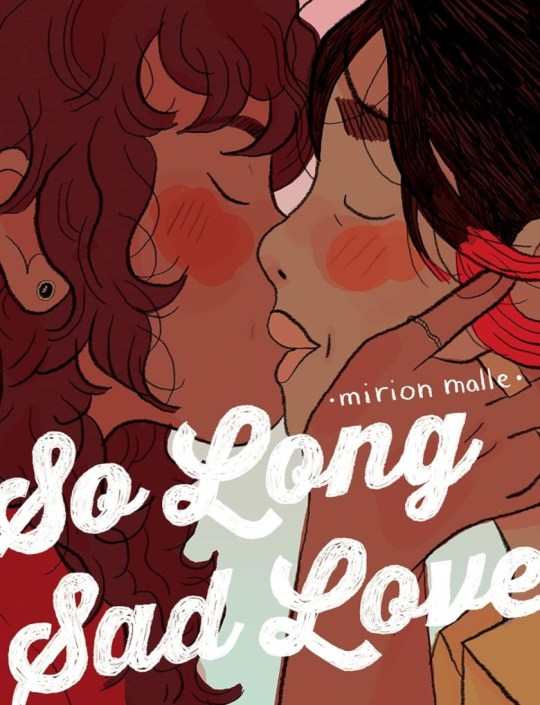
III. So Long Sad Love by Mirion Malle
Cleo is a French comics creator who's moved to Montreal, in part to be with Charles, a Quebecois creator who helps her find a place in the city's tight-knit artistic scene. The relationship feels like a good one, with the normal ups and downs, but then Cleo travels to a festival, where she meets Farah, a vivacious and talented fellow artist. They're getting along great…until Farah discovers who Cleo's boyfriend is. Though Farah doesn't say anything, she is visibly flustered and makes her excuses before hurriedly departing.
This kicks off Cleo's hunt for the truth about her boyfriend, a hunt that is complicated by the fact that she's so far from home, that her friends are largely his friends, that he flies off the handle every time she raises the matter, and by her love for him.
Malle handles this all so deftly, showing how Cleo and her friends all play archetypal roles in the recurrent missing stair dynamic. It's a beautifully told story, full of charm and character, but it's also a kind of forensic re-enactment of a disaster, told from an intermediate distance that's close enough to the action that we can see the looming crisis, but also understand why the people in its midst are steering straight into it.
Packed with subtlety and depth, romance and heartbreak, subtext that carries through the dialog (in marvelous translation from the original French by Aleshia Jensen) and the body language in Malle's striking artwork.
https://pluralistic.net/2024/06/25/missing-step/#the-fog-of-love
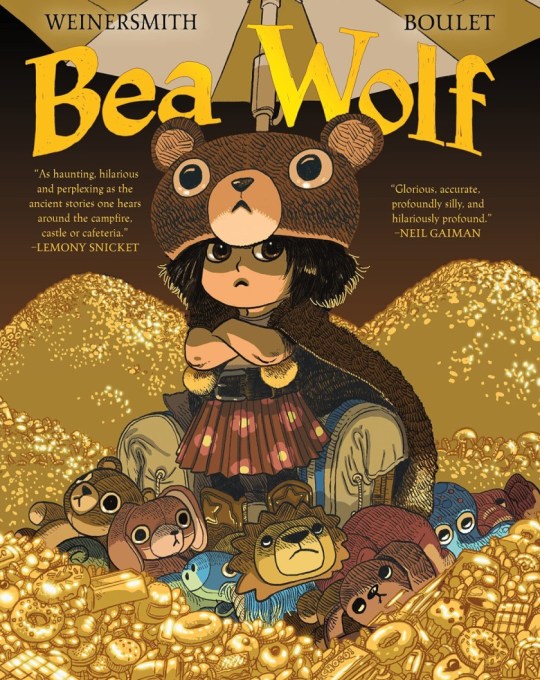
IV. Bea Wolf by Zach Wienersmith and Boulet
A ferociously amazingly great illustrated kids' graphic novel adaptation of the Old English epic poem, which inspired Tolkien, who helped bring it to popularity after it had languished in obscurity for centuries.
Weinersmith and Boulet set themselves the task of bringing a Germanic heroic saga from more than a thousand years ago to modern children, while preserving the meter and the linguistic and literary tropes of the original. And they did it!
There are some changes, of course. Grendel – the boss monster that both Beowulf and Bea Wulf must defeat – is no longer obsessed with decapitating his foes and stealing their heads. In Bea Wulf, Grendel is a monstrously grown up and boring adult who watches cable news and flosses twice per day, and when he defeats the kids whose destruction he is bent upon, he does so by turning them into boring adults, too.
The utter brilliance of Bea Wulf is as much due to the things it preserves from the original epic as it is to the updates and changes. Weinersmith has kept the Old English tradition of alliteration, right from the earliest passages, with celebrations of heroes like "Tanya, treat-taker, terror of Halloween, her costume-cache vast, sieging kin and neighbor, draining full candy-bins, fearing not the fate of her teeth. Ten thousand treats she took. That was a fine Tuesday."
https://pluralistic.net/2024/06/24/awesome-alliteration/#hellion-hallelujah
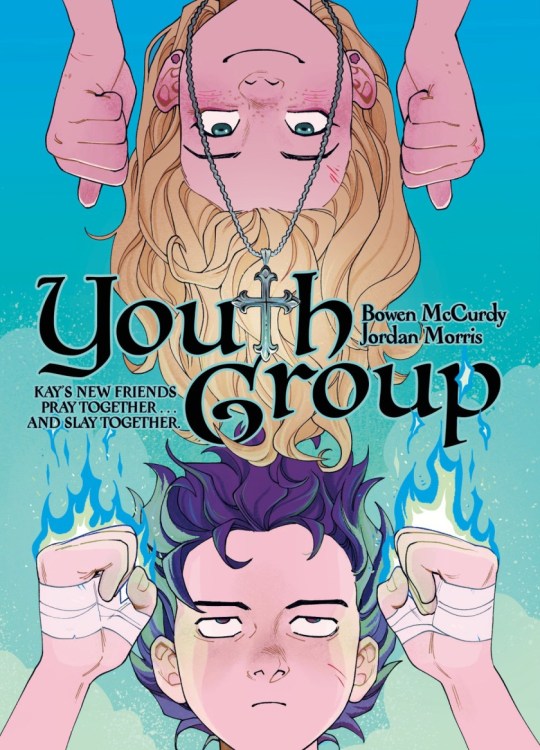
V. Youth Group by Bowen McCurdy and Jordan Morris
A charming tale of 1990s ennui, cringe Sunday School – and demon hunting.
Kay is a bitter, cynical teenager who's doing her best to help her mother cope with an ugly divorce that has seen her dad check out on his former family. Mom is going back to church, and she talks Kay into coming along with her to attend the church youth group.
But this is no ordinary youth group. Kay's ultra-boring suburban hometown is actually infested with demons who routinely possess the townspeople, and that baseline of demonic activity has suddenly gone critical, with a new wave of possessions. Suddenly, the possessed are everywhere – even Kay's shitty dad ends up with a demon inside of him.
That's when Kay discovers that the youth group and its corny pastor are also demon hunters par excellence. Their rec-rooms sport secret cubbies filled with holy weapons, and the words of exorcism come as readily to them as any embarrassing rewritten devotional pop song. Kay's discovery of this secret world convinces her that the youth group isn't so bad after all, and soon she is initiated into its mysteries, including the existence of rival demon-hunting kids from the local synagogue, Catholic church, and Wiccan coven.
https://pluralistic.net/2024/07/16/satanic-panic/#the-dream-of-the-nineties
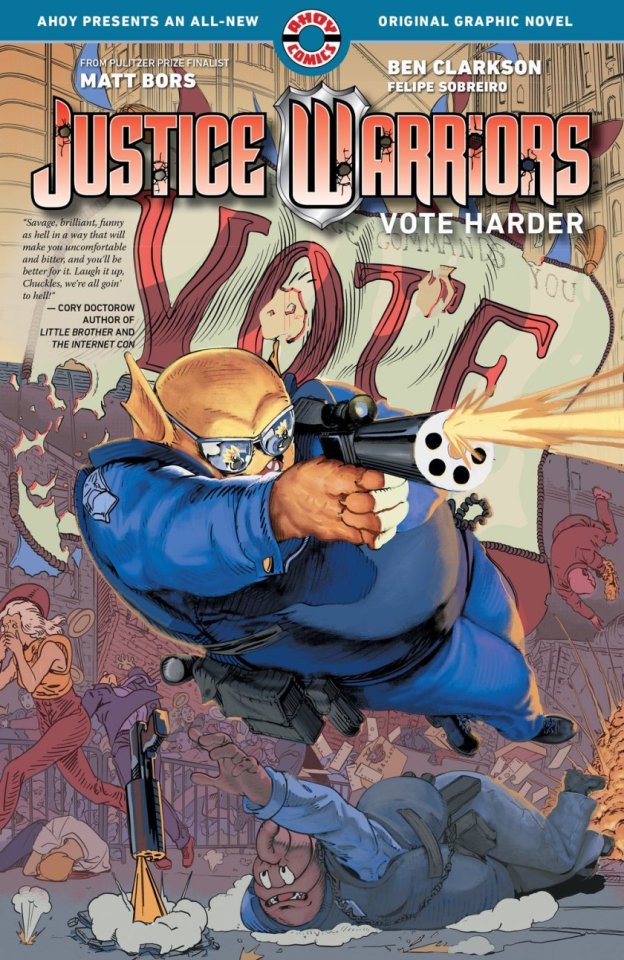
VI. Justice Warriors: Vote Harder by Matt Bors and Ben Clarkson
Vote Harder sees Bubble City facing its first election in living memory, as the mayor – who inherited his position from his "powerful, strapping Papa" – loses a confidence vote by the city's trustees. They're upset with his plan to bankrupt the city in order to buy a laser powerful enough to carve his likeness into the sun as a viral stunt for the launch of his comeback album. The trustees are in no way mollified by the fact that he expects to make a lot of money selling special branded sunglasses that allow Bubble City (and the mutant hordes of the Uninhabited Zone) to safely look into the sun and see what their tax dollars bought.
So it's time for an election, and the two candidates are going hard: there's the incumbent Mayor Prince; there's his half-sister and ex-girlfriend, Stufina Vipix XII, and there's a dark-horse candidate Flauf Tanko, a mutant-tank cyborg that went rogue after a militant Home Owners Association disabled it and its owners abandoned it. Flauf-Tanko is determined to give the masses of the Uninhabited Zone the representation they've been denied for so long, despite the structural impediments to this (UZers need to complete a questionnaire, sub-forms, have three forms of ID, and present a rental contract, drivers license, work permit and breeding license. They also need to get their paperwork signed in person at a VERI-VOTE location, then wait 14 days to get their voter IDs by mail. Also, districts of 2 million or more mutants are allocated the equivalent of only 250,000 votes, but only if 51% of eligible voters show up to the polls; otherwise, their votes are parceled out to other candidates per the terms of the Undervoting and Apathy Allotment Act).
What unfolds is a funny, bitter, superb piece of political satire that could not be better timed.
https://pluralistic.net/2024/09/11/uninhabited-zone/#eremption-season
As I mentioned in the introduction to this roundup, I had three books out in 2024; a new hardcover, and the paperback editions of two books that came out in hardcover last year. There's more on the horizon – a new hardcover novel (PICKS AND SHOVELS) in Feb 2025, along with the paperback of my novel THE BEZZLE (also Feb 2025). I just turned in the manuscript for my next nonfiction book, ENSHITTIFICATION, which will also be adapted as a graphic novel. I'll also be shortly announcing the publication details for a YA graphic novel, a new essay collection and short story collection.
If you enjoy my work – the newsletter, the talks, the reviews – the best way to support me is to buy my books. I write for grownups, teens, middle-schoolers and little kids, so there's something for everyone!
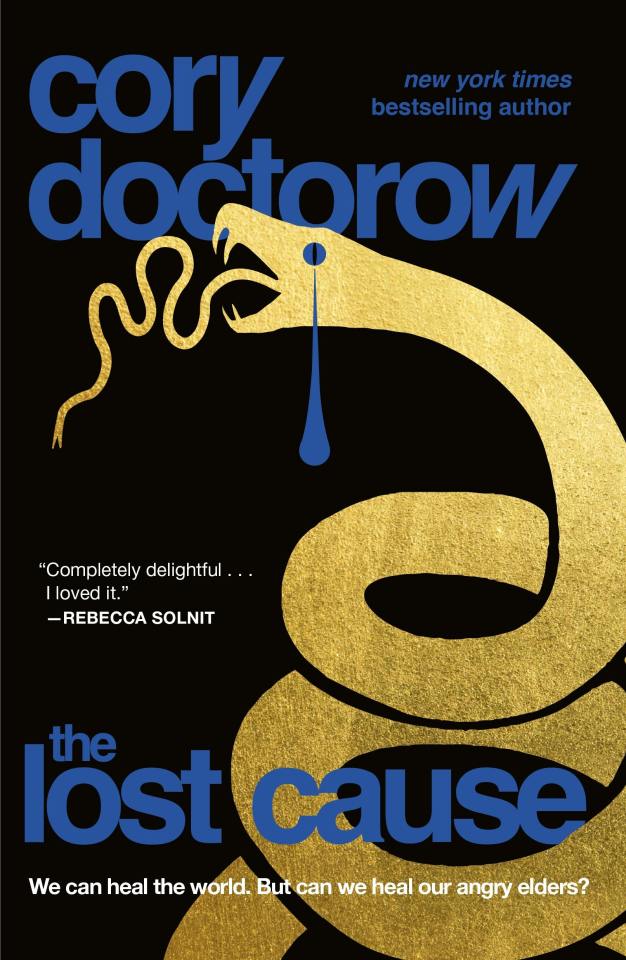
I. The Lost Cause A solarpunk novel of hope in the climate emergency. "The first great YIMBY novel" -Bill McKibben. "Completely delightful…Neither utopian nor dystopian…I loved it" -Rebecca Solnit. A national bestseller!
https://us.macmillan.com/books/9781250865946/thelostcause/
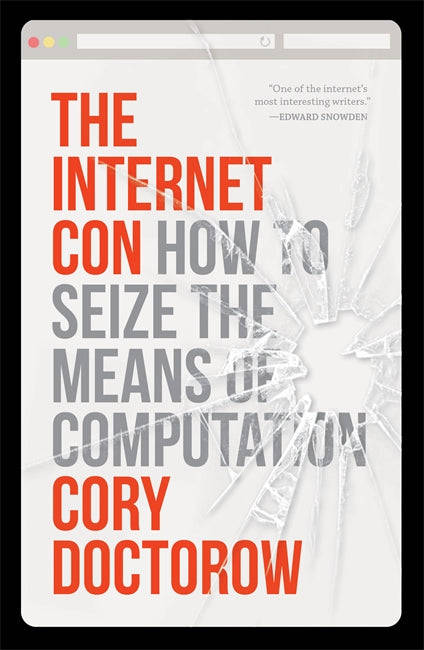
II. The Internet Con: How to Seize the Means of Computation A detailed disassembly manual for people who want to dismantle Big Tech. "A passionate case for 'relief from manipulation, high-handed moderation, surveillance, price-gouging, disgusting or misleading algorithmic suggestions. -Akash Kapur, New Yorker. Another national bestseller!
https://www.versobooks.com/products/3035-the-internet-con
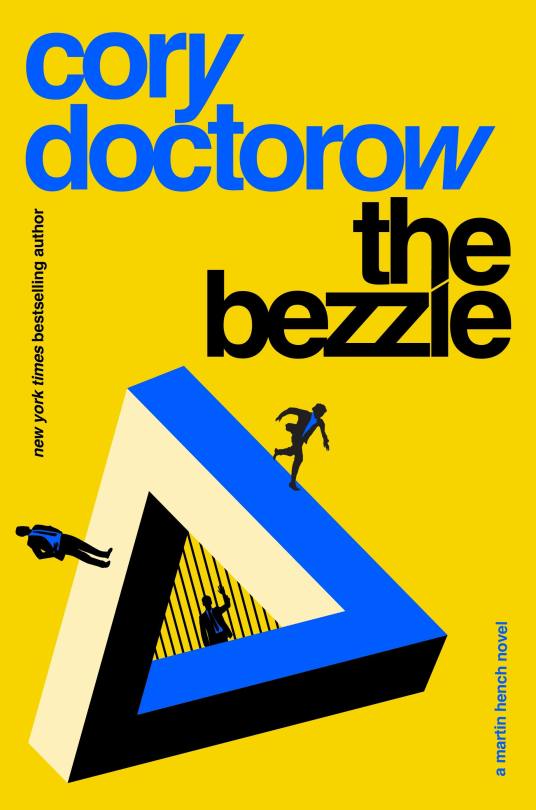
III. The Bezzle. A seething rebuke of the privatized prison system that delves deeply into the arcane and baroque financial chicanery involved in the 2008 financial crash. "Righteously satisfying…A fascinating tale of financial skullduggery, long cons, and the delivery of ice-cold revenge." –Booklist. A third national bestseller!
https://us.macmillan.com/books/9781250865878/thebezzle/
87 notes
·
View notes
Text
So, I recently saw an atheist meme that went "Imagine if all the money spent on religion went to science and medicine. This is the world religion took from us."
This is dumb for a lot of reasons - for starters, the first public hospitals (at least in the Western world) were founded by Christians. But there's another one I thought of in church this morning. There's a lot of money spent on blockbuster films, which they don't object to.
So, I looked up the twenty-five highest-grossing films of the 21st century and added their box office grosses and budgets (the latter found on Wikipedia; if there was a budget range I took the lowest one). This is, of course, only a fraction of the actual money spent on these films (producers spend a lot on advertising while customers spend a lot on merch, DVD, Blu-Ray and streaming), which is in turn only a fraction of the total film market, or even the total bl. But it's still a decent slice of the film market, and so it's useful.
The combined budget and box-office gross of the twenty-five highest-grossing films of the 21st century is $46,113,000,000.
To give some idea of what you could do with just a slice of the blockbuster market, the average federal student loan debt in the USA is $37,853. With 46 billion dollars, you could pay off 1.2 million student loans.
Or for another metric, raising a child in a single-income home from the crib to the age of 17 with a before-tax income of less than $40,000 will cost a total of $157,410. With 46 billion dollars, you could pay for the rearing of 293,000 children from lower-income families from birth to the age of seventeen.
This is the world blockbuster movies took from us.
#i'm saying this as a joke about the double standards#but it's also kind of obscene that so much money is spent on these films when there's so much poverty in the world#miscellaneous
25 notes
·
View notes
Text
The Harkles vs. real Philanthropy by u/wenfot
The Harkles vs. real Philanthropy As the Harkles have babbled on about their philanthropic efforts, I've been enraged by their hypocrisy.I was fortunate to have spent three years the Gates Foundation as a contract admin assistant. (This was during the time before their divorce). I worked in their Gender Equality and K-12 Eduucation departments.Say what you will about the Gateses, but I can tell you the work in these areas is real. Their program officers reviewed grant applications from certified charities that did real work: providing bank accounts for women in Africa so they could manage their own money separate from their husbands; funding scholarships and programs to help low income students in the USA fill out their college applications; helping women and girls break free from domestic abuse; providing healthcare in rural Africa and India so women didn't have to walk for days to find neonatal and post-natal care; funding schools so women and girls, no matter where they live, can get a proper education while providing for their families. That's just a small selection of what they do.The program officers travel regularly to these places to see how the funds are being spent. I arranged countless Zoom calls so they could check in regularly with people running these programs, regardless of the time difference (1:00 a.m. calls are not fun!) These grants are reviewed and if they aren't doing the work they claim to do, the funding is revoked.These grantees and the dedicated people who run them aren't in it for themselves. They are walking the walk, willing to live in poor and dangerous parts of the world. They show up every single day, not just for a glitzy, feel good photo op.The point I'm trying to make is that real philanthropy isn't a vacation. It's being invested not just with money, but with taking the time and making the effort to see what the real needs are and how to meet them.The Harkles are faux humanitarians. Archewell is a sham. They only work one hour a week. Their photo ops make my blood boil because you know damn good and well that they won't provide funds, guidance, or mentorship to these schools and charities once they leave.My hope is that eventually, Archewell will be audited and the grift exposed. These charities and the dedicated, selfless people who run then day after day deserve nothing less. post link: https://ift.tt/R6oIXMd author: wenfot submitted: August 21, 2024 at 05:30PM via SaintMeghanMarkle on Reddit disclaimer: all views + opinions expressed by the author of this post, as well as any comments and reblogs, are solely the author's own; they do not necessarily reflect the views of the administrator of this Tumblr blog. For entertainment only.
#SaintMeghanMarkle#harry and meghan#meghan markle#prince harry#fucking grifters#grifters gonna grift#Worldwide Privacy Tour#Instagram loving bitch wife#duchess of delinquency#walmart wallis#markled#archewell#archewell foundation#megxit#duke and duchess of sussex#duke of sussex#duchess of sussex#doria ragland#rent a royal#sentebale#clevr blends#lemonada media#archetypes with meghan#invictus#invictus games#Sussex#WAAAGH#american riviera orchard#wenfot
35 notes
·
View notes
Text
Jenifer McKenna at Ms. Magazine:
Within days of the election, antiabortion leaders started calling on the incoming administration to defund Planned Parenthood and family planning clinics that refer patients for abortion, and redirect that funding to “pro-life” pregnancy centers.
While serial attacks on abortion rights seize the headlines, the anti-choice movement has quietly built an on-the-ground network of unregulated pregnancy clinics—also known as crisis pregnancy centers (CPCs) and antiabortion centers (AACs)—that is eroding access to comprehensive reproductive healthcare and electioneering against abortion rights, mostly under the radar and increasingly on the public dime. CPCs pose as harmless community resources and licensed women’s health clinics in need of public support. They are, in fact, part of a multi-billion-dollar industry that is directly tied to the extremist legal and advocacy groups that overturned Roe and are now going after medication abortion, contraception, IVF and no-fault divorce. With a staggering $1.7 billion in annual revenue, an estimated 3,000 locations and 100,000 staff and volunteers, the CPC industry is the grassroots backbone of the anti-choice movement. Radical groups including Heartbeat International, Susan B. Anthony Pro-Life America, Students for Life, Turning Point USA and others—many involved in Project 2025—leverage this 50-state network to influence state policy and, under the guise of providing healthcare, siphon escalating taxpayer dollars into the antiabortion movement.
While CPCs have had some access to federal funding since the 1990s, Republican-led states have piloted a dramatic infusion of taxpayer funding into the CPC industry, especially since the 2022 Dobbs ruling. Now, as the Trump administration and congressional Republicans take power, they are certain to also ramp up federal funding for CPCs, making American taxpayers in every state underwrite these unregulated pregnancy clinics. They will justify doing so claiming CPCs “provide medical care that is driving down maternal mortality.” There is no evidence this is true. Not only are CPCs entirely ill-equipped to deliver maternal healthcare, their unlicensed practice of medicine, trafficking of medical disinformation, and unguarded collection of sensitive personal health data actually threaten women’s health and safety. Yet, in more and more communities, unregulated pregnancy clinics are the only resources available to pregnant women and teens, as maternal care deserts proliferate nationwide.
[...]
Unregulated Pregnancy Clinics Increasingly Advertise Medical Services
Crisis pregnancy centers are not medical clinics; they are unregulated religious nonprofits, run by antiabortion advocates. They are not regulated by any of the health, safety, licensing or privacy standards that govern medical offices. Yet these unregulated groups increasingly claim to offer health services. The first multi-state study of CPC websites, “Designed to Deceive,” found that over 88 percent of CPCs in nine states offered one or more of four purported medical services as of 2021: pregnancy tests, ultrasounds, sexually transmitted infection (STI) tests and “abortion pill reversal” (APR). The study also found the pregnancy tests were largely self-administered, the ultrasounds were non-diagnostic, the STI tests did not lead to treatment, and that APR is a medically unproven intervention the antiabortion movement promotes to stigmatize medication abortion. Only one in the 607 CPCs studied offered contraception, and only 5 percent offered prenatal care. Now, the first study of CPC websites in all 50 states, just published in JAMA Internal Medicine, finds a full 91 percent of CPCs nationwide are advertising these same services. Using a new public database of CPC websites called ChoiceWatch.org, researchers found the vast majority of CPCs advertised pregnancy tests, ultrasounds, STI tests and/or APR in the past year. When compared to the 2021 study, the ChoiceWatch study also indicates a significant increase in CPC advertising of ultrasounds (20 percent) and STI tests (24 percent).
[...] Another serious concern: While masquerading as medical providers, unregulated pregnancy clinics are collecting vast amounts of personal and health information from pregnant people, with no privacy protections. CPCs claim to keep client information confidential; many even lie about being HIPAA-covered. But CPCs are not governed by medical privacy laws and not accountable to anyone for keeping client data private. This concern is not theoretical. In May, journalist Jessica Valenti reported a massive client health data breach by Heartbeat International, the largest CPC network in the country. In the post-Roe reality, as women seeking abortion are targeted by extremist groups, lawmakers, and legal officers, CPC client data—date of last menstrual period, use of birth control, pregnancy history, drug and alcohol use, interest in abortion, and much more—is ripe for weaponizing in pregnancy- and abortion-related investigations. [...]
CPCs and the Maternal Mortality Crisis
Anti-choice politicians often go well beyond claiming that CPCs provide healthcare; many claim these unregulated pregnancy clinics are filling gaps in prenatal and postpartum care, and addressing the maternal and infant mortality crisis. Louisiana’s CPC tax credit sponsor, for example, described her bill as “a way to address her state’s abysmal record on infant and maternal mortality, preterm births and low birth weight.” While CPCs are advertising medical services, there is no evidence they are providing pregnancy or maternal healthcare, let alone reducing maternal and infant mortality. Notably, CPCs don’t come close to meeting Level 1 requirements for “Basic Maternal Care” in the American College of Obstetricians & Gynecologist models of maternal care for pregnant women. And CPCs provide no infant or neonatal services. In reality, the disinformation and delay tactics CPCs use to prevent people from accessing abortion may prevent access to timely prenatal care, which is critical to maternal and infant health outcomes. Moreover, the assertion that CPCs exist to provide healthcare blatantly contradicts the industry’s own reporting that it has increased advertising post-Dobbs to reach “abortion-minded women” – often using taxpayer funds to do so. CPCs are not providing healthcare. They are advertising a limited suite of medical services to intercept pregnant women and teens seeking abortion.
The GOP trifecta will seek to make taxpayers pay for the faux clinics (aka “crisis pregnancy centers”/”pregnancy resource centers” that peddle anti-abortion propaganda under the guise of being women’s health clinics.
#Crisis Pregnancy Centers#Abortion#Anti Abortion Extremism#Donald Trump#Trump Administration II#Pregnancy#Reproductive Health
12 notes
·
View notes
Text
I'm ill and not really good at words to begin with but. I think we should just hard reset the entire USA. Like burn the whole motherfucker down and start over. And here's what I would change personally
(readmore bc this is getting Lengthy)
- almost every state is its own individual country. It's too fuckin big and there's too many people for a central federal government to Work. I say almost because some of the really small states could clump together if they want idk I live in one of the bigger ones. In fact most physically large countries should probably do this
- likewise, the "union" of the state-countries should become like Europe where it regulates like. Travel and currency. And emergency wartime shit. Keep free travel open between the states like you can just cross most country borders in Europe
- if we MUST stay as a single country, COMPLETELY rework the voting system. Make it like Australia in particular that shit fucks severely. Honestly even if the states become their own countries we should do this.
- universal basic income. Like do I even need to explain this. Give everyone a basic livable wage that covers basic housing & food comfortably.
- shorter work hours. I'm not an expert but I think it's been proven that like a 5-hour 4-day work week would be just as productive or smth. Don't quote me on that one.
- ban private prisons. Like come on what the fuck.
- (ubi should cover prisoners too. Btw. And literally everyone else over 18. And ppl like 15-17 should start to get a smaller amount that goes into like a trust account that they can access when they're 18. just as a boost)
- COMPLETELY rework school funding oh my GOD what the fuck are we doing. Give grants to struggling schools and schools in poor areas. Abolish this "no child left behind" CRAP that incentivizes memorization over actual learning. MANDATE A HIGHER MINIMUM WAGE FOR TEACHERS.
- Actually tax the 1%. Also no one should be able to be a billionaire. Any income over like $10m (am open to constructive criticism on exact amount cap) should be taxed at 100%.
- universal healthcare. I will *allow* private hospitals to exist (for now) but EVERY state should have at least one easily accessible non-privatized hospital system where every individual hospital is a certain radius from each other so that p much everyone has access to it. The reason private hospitals COULD still exist is so that ppl could choose to pay a bit for expedited care if wanted. Open to constructive criticism on this one.
- decriminalize drugs. All of them. Rehab centers should be covered under universal healthcare too. People turn to drugs most often when nothing else is helping them - it's a systemic issue, not a personal failing.
- abolish student loans. Colleges should run on grants and donations. I shouldn't have to go into debt to learn, even if I just want to take a class or two a year. Also all textbooks should be available for free online, at least to students, or be available in bulk quantities in the library of any college that requires them for any course.
- decapitalize the Internet. It should be ILLEGAL for certain public websites (search engines, wikis, news, etc) to run ads. For websites like YouTube ads should be limited to like 5-10 seconds PER VIDEO.
- (also this isn't like a government level thing but they should totally bring back the branded game sites. Like the sites w barbie browser games n shit. That shit SLAPPED.)
- there should be both an increase in minimum wage and a cap on how expensive necessities can be. Things like bread, eggs, meats, locally growable produce, etc should be capped at a certain price point and not allowed to go above that point. This includes things like medications and menstrual products and also like condoms. "Luxury goods" (premade meals/snacks, coffee, alcohol, etc.) could be exempt from this. Open to constructive criticism on that.
- ban use of oil/gasoline wherever possible. Full stop. There's no fucking reason for it. Also power & water shouldn't be allowed to be privatized in any way and use of renewable energy like solar and wind should be mandatory. Also it should be free to everyone ever
- all companies and their products should be required to be under a certain carbon footprint/pollutant threshold. This includes limited or outright banned use of plastic products forever. We can find disposable alternatives that don't fuck us and the planet.
- nobody over like 60 should be able to run for office I'm fucking sorry but I'm sick to death of old ass motherfuckers running shit get outta here grampa no one likes ur policies
- medical euthanasia should be legal to perform but NOT legal to professionally recommend. Like a doctor can perform it but doctors and nurses cannot tell you that you should. It should also be regulated in some ways but I'm not about to get into that rn
- decriminalize sex work. Just. Full stop. People are gonna do it no matter what laws are in place, it's the oldest profession for a reason, decriminalize it and put in place laws protecting sex workers from abuse & exploitation.
- (obvs with above there should be SOME laws against specifically shit like performing sex work for/with a minor & other shit like that but that falls under "pedophilia is illegal" which like yeah good.)
- (on that topic though any CLEARLY DRAWN/NOT PHOTOGRAPHICAL porn REGARDLESS OF CONTENT should be fully allowed so long as it can e reasonably determined that no real life people were used as reference or could be recognized via the art. Like I'm Not Into even fictional children being in porn art but it isn't hurting anyone even if it's gross and I don't get it. Adults can to photo porn stuff as long as everyone's consenting tho)
- decensor the Internet. I don't care that there are children here. Sure you can have specific sites catered to children but they should not be allowed to have ads AT ALL (see "decapitalize the Internet") and anywhere not designated as specifically "for children" should be completely uncensored or have options to be completely uncensored. Make people parent their own fucking kids again.
- actual separation of church and state. If the only root argument in favor of a law or bill is "bUt ThE BiBlE" it should just be tossed full stop no exceptions. Also businesses and such should be incentivized to allow people of any religion their holy days off (unless no one is guaranteed to have their holy days off)
- On that note strengthen anti-discrimination laws. No one should ever be denied anything simply for their gender, presentation, religion, sexuality, race, etc.; this does not apply to any closed religious practices (where no one outside that particular religion is supposed to take part in a ceremony, style of dress, etc.) by any recognized nonprofit group.
- just give the native americans back their lands already. National parks should be allowed to be "maintained" (lived in) by indigenous people in whatever ways they want tbh. The only "rule" should be that visitors/tourists should still be allowed to enjoy the spaces so long as they are respectful of the land and the people. Humans are not inherently separate from nature.
- (if anything in the above point is worded badly I'm sorry once again I am The Sick and words are hard)
- work with Canada and Mexico on fully opening borders bc seriously what the fuck.
Idk I'm sure there's more I would change but I can't think of anything else right now tbh. But like to do any of those we'd have to completely uproot the entire system and I dont. Know how we would do that. without putting people through unnecessary risk. Idk I'm just fuckin weird rn
6 notes
·
View notes
Note
What are your thoughts on class the way it's seen OUTSIDE of the U.S.? In most countries, your class has to do with your surname/family (like a respectable European family name with a history of achievers), religion, social network, cultural capital, education etc. meaning for example, you can be a broke liberal arts student but because your grandfather was a successful buisness owner with a good surname and you have a good social and cultural capital, you are considered middle class even if you have 1$ to your name. And a rapper with a billion dollars or someone like Kylie Jenner or the Kardashains are still seen as trashy regardless of their income. Thoughts on that class system?
the dialectical materialist framework (developed by marx, foundational) can be used to analyze any society, so i'll try to do that here or at least point you in the right direction.
i've been specifying the us because i understand our liberal misconceptions the best, but defining class as your relationship to the means of production applies just as well in europe. one difference is that the ruling class there often still contains elements of the old feudal aristocracy. marx understood class (like everything else) as dynamic, always in the process of changing from one form to another. marx and engels actually start off the communist manifesto explaining this:
..in the Middle Ages, feudal lords, vassals, guild-masters, journeymen, apprentices, serfs...almost all of these classes, [were arranged into] subordinate gradations...Our epoch, the epoch of the bourgeoisie, possesses, however, this distinct feature: it has simplified class antagonisms. Society as a whole is more and more splitting up into two great hostile camps, into two great classes directly facing each other — Bourgeoisie and Proletariat.
basically, the old feudal classes find themselves increasingly becoming part of either the business-owning class or the workers. so the cultural attitude of someone having prestige from their family name is just the cultural reflection of this economic arrangement. perhaps their once-aristocratic family continued to be part of the ruling class by joining the bourgeoisie as it took power (ex.: that lord guy who writes downton abbey), or maybe this "family of achievers" refers to a bourgeois relative who invested smartly a couple hundred years ago and their descendants reap the benefits--in which case it's pretty much the same as being a kennedy in the usa.
in terms of the "broke liberal arts student" example, there's a couple things that could be going on here. one is the process of "proletarianization," where a person (or group) of a higher class like the bourgeoisie is pushed out of that class into the proletariat. however, what's much more common is a situation where someone bourgeois temporarily does not have enough of their assets in a liquid (spendable) form (and are experiencing for the first time what people in lower economic positions deal with all their lives...). you have $1 to your name today, but what other assets are available to you? if you hocked all of it or are disowned and cut off, and have no choice but to sell your labor for wages for the rest of your life, you've been proletarianized. if you still have access to the assets (which is what the terms "social and cultural capital" imply to me) then this is more a case of a bourgeois family mismanaging its funds. hardship or no, the amount of money in your checking account alone does not determine your class position. jeff bezos famously takes home a comparatively small salary because most of his net worth is in investments, but he is most certainly still part of the haute bourgoisie.
i don't know of any billionaire rappers, but i think it's good to break down celebrity here. first of all, europeans see rap as "trashy" mainly for the same reason as americans--racism. (the karjenner clan is also probably seen as "trashy" mainly because their brand is built from appropriating black american culture.) fame doesn't necessarily correlate to power over society--in fact, many say celebrity culture is a distraction from who's really pulling the strings. kylie jenner invests her capital (which she gets from her bourgeois family) into a business that generates more wealth for her, but that doesn't mean she has anywhere near the power and influence of someone like the koch family--who are actual billionaires. they are both bourgeois, both capitalists, and they share more interests with each other than with workers, but one is a much more powerful member of that class with much more capital. having disdain for the karjenner clan doesn't mean they're now proletarian wage laborers.
i don't necessarily think it's completely useless to think about society in terms of income tax brackets either, just that liberal analysis muddies the waters. the attitudes and prestige you're talking about are the result of underlying economic class relations, not the cause of them (technical term: base and superstructure). we need to get a handle on basic marxist concepts like class if we want to have useful conversations and accurate plans of attack.
some suggested readings to get a handle on things:
principles of communism by engels (brief summary, more direct than the manifesto). i also like wage labor & capital
marx for beginners (graphic/illustrated, from the 70s but gives a good overview)
curriculum of the basic principles of marxism-leninism, part 1 (translation of vietnamese gen ed college textbook, also available as a paperback. has wonderful in-depth footnotes and discussions on basic tenets of dialetical materialism--i'm still working through it all! the translator talked about some basics in her youtube vids as well)
introductory videos:
second thought actually has a video about "middle class" (his channel is 101-level and here he encourages the petty bourgeoisie to side with the proletariat)
for more rigor/book recs i like hakim
the marxist project has helped me understand some basic ideas as well
and of course david harvey is here to help you get through capital (one day i'll read it all, i swear...)
#ask.txt#theory#readings#yt recs#long post#bruh this took me hours to type LOL#marxism#dialectical materialism#class analysis
6 notes
·
View notes
Text
Given the current political situation this is important for people to know:
To anyone living in the state of Oregon, USA, if you’re under a certain income (this includes pretty much all college students!) you can get quite a bit of your reproductive health care fully paid for by the state!
Yes this includes IUDs, which normally cost $1000+ and are free if the state of Oregon covers it! You don’t need to be enrolled in Medicare / Medicaid, and you can choose whether they use your insurance so your family doesn’t get to know your medical history!
The program is called C-Care, and I’m pretty sure there’s an A-Care for those seeking to abort as well!
#important#Oregon#reproductive rights#us politics#yeah this election sucked bad but there’s things to help with it
5 notes
·
View notes
Text
im getting really fucking sick of inboxes/msg requests full of obviously fake palestinian fundraising scams. its fucking sick what these ppl are doing, training everyone to withhold their trust, exploitation in its worst form plain & simple.. i dont have enough income to set aside for donation anyway and especially with the bombings in rafah at the same time egypt closes their already prohibitively expensive border, watching history repeat itself at this level of terror is agonizing. while students who dare to peacefully dissent are violently attacked, harassed, excommunicated from their institutions and arrested and then once theyre out of jail theye expected to just continue studying like nothings going on. and somehow singular imperial powers (read: USA)are able to not only ignore their own citizens but literally threaten and circumvent agents and procedures of international government. that was supposed to be enough but it wasnt. american soldiers killing themselves with fire isnt enough, mass destruction isnt enough, civil disobedience isnt enough, marching on washington, in front of our capitols & city halls, isnt enough, nothing under our control seems to have any effect on the unfolding outcome which is ultimately, inarguably, irreparably genocide. what the fuck are we supposed to do?
#stating the obvious on tumblr#is really not much more than a cope i feel like i should be honest abt that#especially cause this is sort of an echo chamber#it feels pretty shallow to even be seeking catharsis by writing about it#but whatever#i would like to think its at least better than doing nothing#t#nfo
8 notes
·
View notes
Text
Paid for prison cell.
Cameras everywhere, regular inspections (the first year, cuz they were changing managers, I swear, I got bed bug inspected 6 times. NEVER had them), they can swab your apartment for cigarette or cannabis smoke in order to kick you out, not allowed to have guns, can't even control my thermostat. If I make more money, they not only take more money, but I lose funding of food stamps. In other words, I am at a place where even if I made more money, I would never see it. Then if I made a SHIT ton of money, it is all garnished over my student loans. So why work hard? Why even fucking TRY!? ANSWER ME!
And you call this country FREE? I actually, cuz of low income housing, have less RIGHTS than most citizens. That is fucked up. Cuz I am poor, I get less rights. I can actually not AFFORD FREEDOM. This is nothing more than a paid for prison cell.
So NEVER be a proud american* in front of me. This country is a SHITHOLE. And FOUNDED ON A GENOCIDE OF THE NATIVES, so if you take pride in genocideS, you're a sick fuck. And the world would be better off without you.
*btw, I keep pointing this out. I am trying to never say 'America' or 'Americans.' We are the USA. As pointed out by foreigners, there's a NORTH, MIDDLE, and SOUTH AMERICA. So calling yourself 'America' is some of the most egotistical nationalist propaganda shit I ever saw pointed out to me.
#usa#american#america#paid for prison cell#poor#poverty#homeless#homelessness#college#student debt#student loans
2 notes
·
View notes
Text

Meet the Writer
I am a student living in the southeast USA, but originally from the northeast. In addition to being in school, I also work full time from home. So, when I'm not writing creatively, I am writing for work or school. My laptop is another appendage at this point 😂
I am in my late 20's, I use she/her pronouns, and I am AuDHD. I have a wide range of interests, Guns N' Roses is obviously one of my special interests and has been since I was a small child. I try to hit up as many GNR concerts or related acts (Duff’s & Slash’s solo stuff) as possible so follow here for incoming videos and pictures from the rail 🎸I am hesitant to link my instagram here but if anybody wants it PM me and I’ll give it to you :) I will likely post more concert stuff on there rather than here. There is also a ton of animal content on there as well for those who enjoy animals 🥰
I enjoy other rock bands/artists such as Motley Crue, Metallica, AC/DC, Evanescence, etc. I’m also into horror, history, superheroes, and animals/nature.
REQUESTS: CLOSED AT THIS TIME. I am currently working on my multi-chapter fic, Uncharted, but I may be open to requests in the future :) I have a difficult time writing one-shots so if you are following along with Uncharted and have some ideas or suggestions, feel free to send them!
5 notes
·
View notes